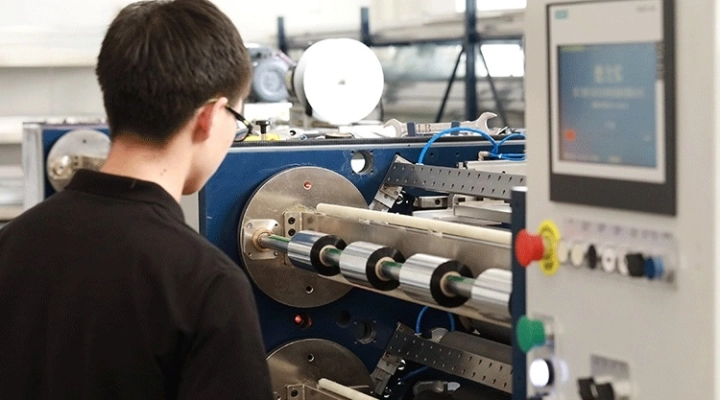Slitters include a wide range of knives and sharp blades to ensure that paper or film products are precisely cut into predetermined sizes and shapes for a variety of end uses. When the material is fed and cut to the required specifications, it enters the rewinding mechanism for winding. The operator of the slitting machine must have a basic understanding of the equipment and strictly follow the operating procedures carefully designed by the slitting machine manufacturer. The following editor will take you to a brief understanding of the conventional slitting machine operation process.
Preparation before the operation of the slitter
Before you start using the slitting machine, you need to check many things to make sure your machine is safe, such as turning on the power to check if the voltage and current are correct and whether there is a short circuit. Whether the gas path is intact, whether the voltmeter is accurate and stable, and whether there is any air leakage. You also need to check the sharpness of the blade, as using a blunt blade will affect the quality of the slit. Also, make sure there is no material left over from previous slitting work on the machine, as this will affect the performance of your job. After a detailed reading of the production plan, the machine is properly set up and adjusted, and the slitter blade is adjusted to any measured value of the desired slitting width, either manually or automatically. According to the type, thickness, length, width and other parameters of the slitting material, the corresponding settings are made on the touch screen. Install the cores that meet the specifications and quantity on the winding rollers, and adjust the pressure of the pressure rollers to the appropriate value. These pre-start-up process operations avoid errors during operation and are critical to saving time and money.
The slitter feeds and feeds and runs the unloading operation process
To carry out hoisting operations for the parent roll material that needs to be slit, it is necessary to pay attention to the difference between inside and outside when feeding, and control the unwinding shaft head to clamp the paper core to firmly fix the coil on the unwinding frame of the slitting machine. According to the preset film walking process diagram of the slitting machine, the material is threaded from the unwinding station to the winding station in a certain direction, and the blade should be kept raised when passing through the knife roller to avoid hurting the hand, and ensure that the edge of the material is located in the middle of the stroke of the corrector. Finally, align the paper core on the reel with the material and bond the material to the reel core. If the slitting machine is at the end of the material operation and needs to change the roll, you only need to pull out the new parent roll material and unfold it smoothly and pass through the film splicing table, control the pressure rod to fall and cut off the excess edge material, and use the tape to bond the material together neatly and wrinkle-free. The slitting machine with a higher degree of automation can also fix one end and automatically pull the material layer along the path required by the slitting process through the feeding device and distribute it evenly on each roller of the slitting machine.
After the slitting machine is turned on and running, the operating status is carefully monitored, and the parameters such as slitting speed, tension and pressure are finely adjusted according to the actual working conditions throughout the production process. Strictly inspect the quality of the winding material, whether there are defective products or other defects such as holes, wrinkles and other defects involved in the finished product. In case of unexpected problems, we must strictly follow the operation process to slow down, shut down, cut off power or cut off gas. After the slitting work is completed, the winding shaft is deflated, and the finished coil with the slitted specifications is extracted from the winding shaft, and passed to the next process through the unloading rack for sealing and packaging. After confirming that there is no roll material on the reel, a new paper core can be put on and inflated and locked for re-slitting.
Risk control in the operation process of the slitter
In any case, safe operation must be put in the first place, and the operation process provided by Delishi Machinery will provide relevant items that need to be checked before problems occur. Familiarize yourself with the location of the EMERGENCYSTOP button and the warning signs on the slitting equipment before turning on the machine for the first time, and protective equipment such as protective glasses and steel-toed boots will protect you from flying or falling objects. For example, blades eject or break from the machine during high-speed operation, and metal fragments flying at high speed in the air can cause blindness or worse for operators who are not wearing protective gear. Handling heavier coils when loading and unloading may also cause smashing accidents due to falling. Before turning on the slitter, all personnel need to leave the machine to ensure personal safety. Delishi Machinery can also identify the operation area by setting the sensor, that is, if someone enters the operation area, the equipment will be stopped automatically. During the operation of the slitting machine, do not touch the running roller or film roll with your hands. If you encounter a problem, please read the manual carefully or consult the technical staff of the Delishi manufacturer in time, and do not try to solve the problem without knowing it, which will lead to serious injury and expensive medical expenses.
Accidents are usually caused by negligence, and the operator should be in awe of the slitter operation process, ignoring it will cause you great harm.
Fonte notizia
www.delishmachine.com products slitting-machine.html








